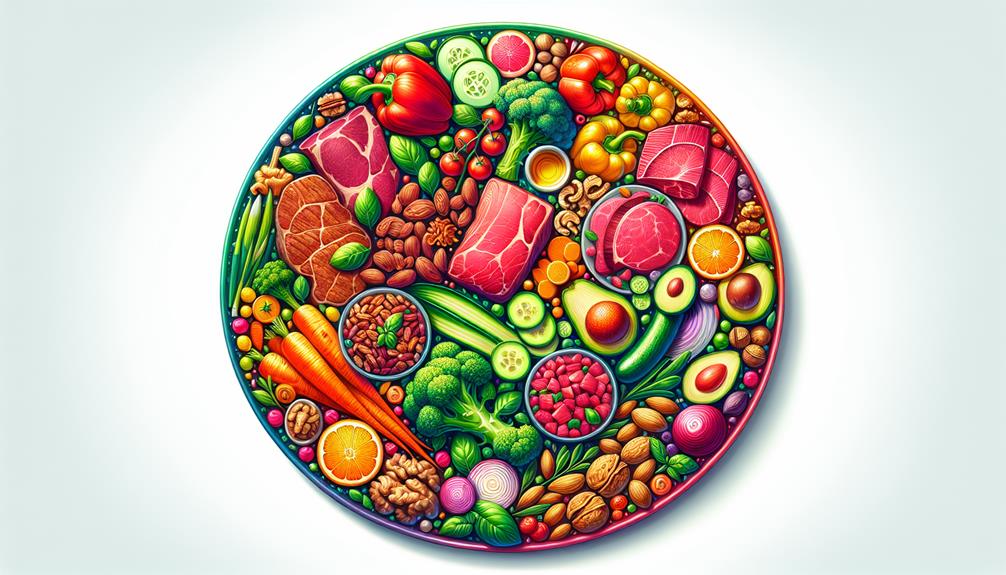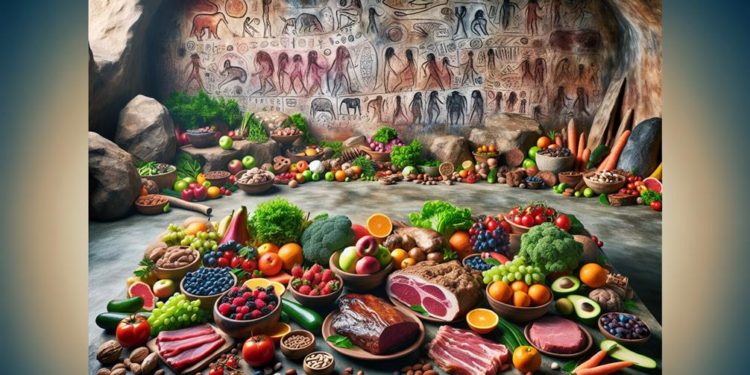Have you ever wondered what it would be like to eat like a caveman? Well, coincidentally, the Paleo diet allows you to do just that. This ancient way of eating has gained popularity in recent years for its potential health benefits. But what exactly does it entail? In this discussion, we will explore the origins of the Paleo diet, its key principles, the potential health benefits it offers, and how you can incorporate it into your modern lifestyle. So, if you're curious about how to improve your wellness by embracing your inner caveman, hang tight as we dive into the world of Paleo diet plans.
Key Takeaways
- The Paleo Diet is based on the belief that our ancestors had a natural and beneficial diet, emphasizing foods eaten by hunter-gatherer ancestors.
- The diet excludes processed foods, grains, dairy products, and legumes, and instead focuses on lean proteins, fruits, and vegetables.
- Incorporating the Paleo Diet into your lifestyle involves meal planning, stocking up on healthy options, and exploring Paleo recipes.
- The Paleo Diet promotes improved digestion, weight management, increased nutrient intake, and overall health and well-being.
The Origins of the Paleo Diet
The origins of the Paleo Diet can be traced back to the early 1970s when gastroenterologist Walter L. Voegtlin first popularized it. The Paleo Diet is based on the evolutionary perspective that our ancestors, who lived during the Paleolithic era, had a diet that was more natural and beneficial for human health. This diet emphasizes consuming foods that our hunter-gatherer ancestors would have eaten, such as lean meats, fish, fruits, vegetables, nuts, and seeds. It excludes processed foods, grains, dairy products, and legumes, as these were not part of our ancestors' diet.
Voegtlin's book, "The Stone Age Diet," published in 1975, played a significant role in spreading the idea of the Paleo Diet. His book highlighted the benefits of adopting a diet similar to that of our ancestors, claiming that it could lead to weight loss, improved digestion, and reduced risk of chronic diseases.
Since then, the Paleo Diet has gained popularity among individuals seeking a more natural approach to nutrition. While its effectiveness and scientific evidence are still debated, many people continue to follow this diet as a way to reconnect with our evolutionary roots and potentially improve their health.
Key Principles of the Paleo Diet
To understand the key principles of the Paleo Diet, it is important to grasp its foundation in ancestral nutrition and the belief that our hunter-gatherer ancestors had a diet that promoted optimal health. The Paleo Diet emphasizes consuming whole, unprocessed foods that mimic what our ancestors would have eaten thousands of years ago. Here are three key principles of the Paleo Diet:
- Eat plenty of lean proteins: The Paleo Diet encourages the consumption of lean meats, such as chicken, turkey, and fish, as well as eggs. These protein sources are rich in essential amino acids, which are crucial for building and repairing tissues in the body.
- Load up on fruits and vegetables: Fruits and vegetables are packed with vitamins, minerals, and antioxidants. They provide essential nutrients while also adding fiber to the diet, which aids in digestion and promotes a feeling of fullness.
- Avoid processed foods and grains: The Paleo Diet discourages the consumption of processed foods, including refined sugars, vegetable oils, and grains. Instead, it focuses on natural, unprocessed foods that are nutrient-dense and promote overall well-being.
Incorporating these key principles into your meal prep and exploring Paleo recipes can help you adopt a healthy and balanced Paleo Diet lifestyle.
Health Benefits of Eating Like a Caveman

Eating like a caveman can offer numerous health benefits, including improved digestion and increased nutrient intake. One of the main advantages of following a paleo diet is its positive impact on digestion. The diet promotes the consumption of whole, unprocessed foods, which are easier for your body to break down and absorb. This can lead to improved digestion and a reduction in digestive issues such as bloating and constipation.
Additionally, the paleo diet can support weight management. By eliminating processed foods and focusing on lean proteins, fruits, vegetables, and healthy fats, the diet can help regulate blood sugar levels and promote satiety. This can lead to better portion control and a reduced calorie intake, which can aid in weight loss or maintenance.
Furthermore, the paleo diet is rich in nutrients. By emphasizing whole foods, such as fruits, vegetables, nuts, and seeds, the diet provides a wide range of essential vitamins, minerals, and antioxidants. These nutrients are important for overall health and can support optimal bodily functions.
Incorporating the Paleo Diet Into Your Lifestyle
Consider incorporating the Paleo Diet into your lifestyle for improved health and overall well-being. The Paleo Diet is centered around consuming whole, unprocessed foods that were available to our ancestors during the Paleolithic era. By following this diet, you can reap numerous benefits, such as weight loss, improved digestion, and increased energy levels. Here are three ways to incorporate the Paleo Diet into your lifestyle:
- Plan your meals: Meal prep is key to successfully following the Paleo Diet. Take some time each week to plan your meals and prepare them in advance. This will ensure that you always have healthy, Paleo-friendly options on hand and reduce the temptation to reach for processed foods.
- Stock up on Paleo-friendly snacks: Snacking can be a challenge when following the Paleo Diet, as many traditional snack foods are off-limits. However, there are plenty of Paleo-friendly snack options available, such as nuts, seeds, fruits, and vegetables. Keep these snacks readily available to satisfy your cravings and keep you on track.
- Focus on nutrient-dense foods: The Paleo Diet encourages the consumption of nutrient-dense foods such as lean meats, fish, fruits, vegetables, nuts, and seeds. These foods are packed with vitamins, minerals, and antioxidants that support optimal health. By prioritizing these foods in your diet, you can ensure that you are getting the nutrients your body needs to thrive.
Incorporating the Paleo Diet into your lifestyle can be a rewarding and beneficial choice for your health. By meal prepping and stocking up on Paleo-friendly snacks, you can set yourself up for success on this eating plan. Remember to prioritize nutrient-dense foods for optimal health and well-being.
Tips for Success on the Paleo Diet

When following the Paleo Diet, implementing a few key tips can help ensure your success on this eating plan. One important tip is to prioritize meal prep. By dedicating some time each week to prepare your meals in advance, you can save time and ensure that you have healthy, Paleo-friendly options readily available. This can be as simple as chopping vegetables, marinating meat, or cooking a large batch of soup or stew. Another tip is to make a grocery shopping list and stick to it. By planning your meals ahead of time and creating a detailed shopping list, you can avoid impulse purchases and ensure that you have all the necessary ingredients for your Paleo meals. Additionally, it's helpful to familiarize yourself with Paleo-approved foods and substitutes. This will make it easier to navigate the grocery store and choose products that align with your dietary goals. Finally, don't be afraid to experiment and try new recipes. The Paleo Diet offers a wide variety of delicious and nutritious options, so have fun exploring different flavors and cooking techniques. By following these tips, you can set yourself up for success on the Paleo Diet.
| Tips for Success on the Paleo Diet | ||
|---|---|---|
| Prioritize meal prep | Make a grocery shopping list and stick to it | Familiarize yourself with Paleo-approved foods and substitutes |
| Experiment with new recipes | Enjoy the journey and have fun with your Paleo meals |
Frequently Asked Questions
Are There Any Specific Food Restrictions or Limitations in the Paleo Diet?
There are certain food restrictions and limitations in the paleo diet. It focuses on avoiding processed foods, grains, legumes, dairy, and refined sugars. Instead, it emphasizes consuming lean meats, fish, fruits, vegetables, nuts, and seeds.
Can the Paleo Diet Be Followed by Vegetarians or Vegans?
Yes, the Paleo diet can be followed by vegetarians or vegans. There are plenty of vegetarian alternatives and vegan-friendly recipes that can be incorporated into the Paleo lifestyle while still maintaining its principles.
Is the Paleo Diet Suitable for Individuals With Certain Medical Conditions or Dietary Restrictions?
The paleo diet can be suitable for individuals with certain medical conditions or dietary restrictions. For example, it may benefit those with diabetes by promoting weight loss and improved blood sugar control. Additionally, it can be helpful for those with gluten intolerance, as it eliminates grains.
How Long Does It Typically Take to See Results or Experience Health Benefits From Following the Paleo Diet?
You can typically start seeing results and experiencing health benefits from following the paleo diet within a few weeks. Improved energy levels, weight loss, and better digestion are some common benefits reported by many.
Are There Any Potential Side Effects or Risks Associated With the Paleo Diet?
You may experience potential side effects or risks when following the paleo diet. These include nutrient deficiencies, impact on gut health, sustainability, impact on cholesterol and blood sugar levels, and long-term effects on cardiovascular and bone health.
Conclusion
In conclusion, embracing the paleo diet can be a powerful symbol of reconnecting with our ancestral roots and prioritizing our health in today's modern world. By following the key principles of this eating plan and incorporating it into our lifestyle, we can experience numerous health benefits. From weight loss and improved digestion to increased energy and better overall well-being, the paleo diet offers a holistic approach to wellness. So why not give it a try and discover the transformative power of eating like a caveman?













